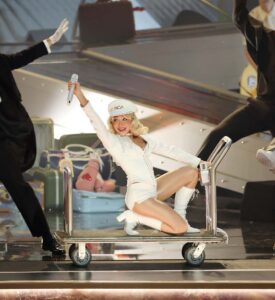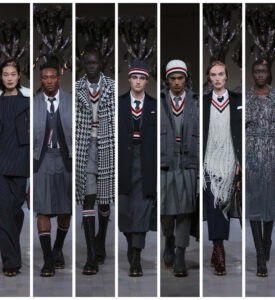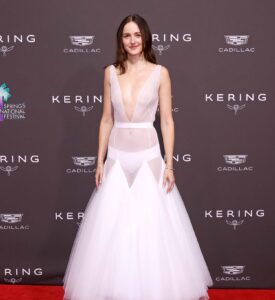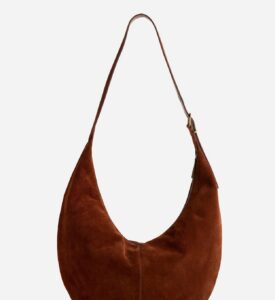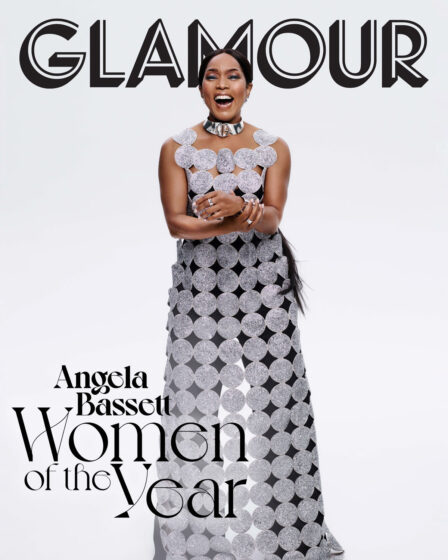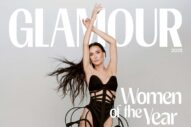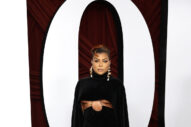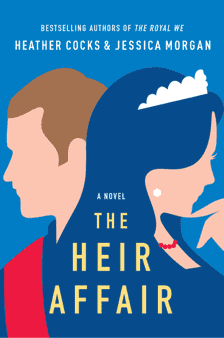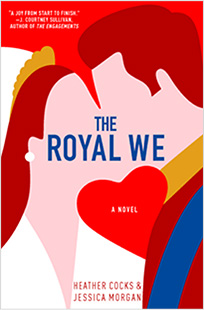I cannot wait to see Wakanda Forever, and that movie — and, frankly, a trailer that was so moving it gave the whole Internet goosebumps — is the central reason for Angela Bassett’s selection as one of Glamour’s Women of the Year. She’s joined by Haim, Jennifer Hudson, designer Aurora James, anti-gun-violence activist Shannon Watts, and physician and abortion-rights activist Dr. Rebecca Gomperts, all of whom have multi-photo spreads that I’m sharing in the above slideshow (which accounts for its size).
The piece about Angela is gushy, but in a way where you can tell the author Zandria Robinson is writing from a place of genuine inspiration and not simply tongue-bathing the assigment du jour. Some of it just feels very personal. Angela also gives good bite; take this one, about Tina Turner, whom she played — to star-making accolades — in What’s Love Got To Do With It:
“I had never seen her perform as a young person, but those older than me, black and white, had, and she had made an impact with her gift,” Bassett booms. “This beautiful, statuesque Black queen with talent and power coming out of every pore! That commanded you to bow down! And to look up! That’s who we are. Her, on that stage.”
I interrupt to ask her whether she’s considered that she is that for us—for the Gen X’ers and millennials and Z’s and those alphabet generations still to come.
“Ohhh.” She pauses, as if she hasn’t thought about it all that much. “Good, great. I’m amazed,” she says after a breath. “Sometimes I don’t even see it. I just have love and respect for who we are, and I have just always tried to live up to how we see ourselves. I try not to stand on the outside and critique what I’m doing in the continuum. I try to stay in love with it.”
The Shannon Watts piece by Emily Witt chronicles how her small-scale gun-sense organization from 2012 swelled into what’s now known as Everytown For Gun Safety. It’s a little harder to excerpt, but I like that when so many of us feel hopeless, she refuses to:
It would be easy to look at the events of 2022 and question whether gun violence is an intractable American reality. Gun deaths went up during the pandemic, as did gun ownership, with some 400 million guns now in circulation in the United States. But this time, unlike a decade ago, a well-prepared movement is in place to respond. “I think Shannon and I agree that our movement will go down in history as one of the nation’s great social change movements, just like the civil rights movement or the movement for marriage quality,” says [Chris] Murphy, the senator from Connecticut. “We’re fighting against a very powerful status quo and a long history of the romanticization of gun ownership. I think we understand we’re going to fail a lot before we succeed, but the cause is worth it. It’s literally life-or-death.” […]
We have created what we needed to go toe to toe with one of the most powerful wealthy special interests that has ever existed,” [Watts] tells me. “We are beating them. And when we lose a battle, we’re able to get right back up and fight back.”
Aurora James, in a chat with Lola Ogunnaike, talks about the 15 Percent Pledge — a promise that retailers will give at least 15 percent of their shelf space to Black-owned businesses. (James is also the designer for Brother Vellies.) She called out these companies in 2020, during Covid, and two dozen of them (like Sephora and Macy’s) have committed:
I really was terrified to do it. It’s a lot easier to just sit in your earned comfort than it is to alienate a lot of the people at this table that you worked very hard to get to. But I felt like I had managed to earn a certain level of access, and it was time for me to use my own privilege to advocate for other people who had not yet been given the opportunities that I had. In my family growing up, part of “aspiration” meant not just success for what you can buy yourself, but success for the doors that you’re going to be able to open for other people and the opportunities that you’re going to be able to say no to if it doesn’t benefit your community. […] At this point, when we talk about the 29 major retailers that have committed to the pledge, it becomes a little bit more awkward for the ones that haven’t. Why are they unwilling to do it? Why would they rather sit on the sidelines and allow other people to do the heavy lifting? Why do they not want to commit to the Black community, and the whole country, in this way? This is not only a proposition to help Black Americans; it’s a proposition to help small businesses across the country.
Dr. Rebecca Gomperts, profiled by Mattie Kahn, is a fascinating badass woman, who — from her office in Amsterdam — has created a network that can provide medical abortions to women in states that don’t (and do) allow them (and works to make them affordable). Read up and familiarize yourself with Aid Access, because as she points out, for every woman who’s aware of it there are far too many who are not.
Rebecca Gomperts, MD, PhD, is now one of the limited few providers of medication abortion in almost two dozen states in America. Her mandate is abortion for whomever wants it, wherever. What a mistake it had been for pro-choice activists to frame an act of basic health care as some rare occurrence or horrible last resort, she thought. The movement should have been frank. Bolder. Or as Gomperts puts it: “We should just have said, ‘No, it’s not difficult. It’s just a decision we make as women. Fuck off. You have nothing to do with it.’” […]
“I have great trust in the resilience of women, and that gives me hope,” Gomperts tells me. “At some point, we will all have to decide, ‘You know what? We’ll do it regardless. We don’t care. You want to control us. We are not controllable.’”
Jennifer Hudson, interviewed by Perrie Samotin, mostly discusses her new talk show. I liked this:
Whether she’s costarring in 2008’s Sex and the City movie despite never having seen the original series, making her Broadway debut in 2015’s revival of The Color Purple, being a mentor on The Voice, jumping headfirst into daytime TV, or embodying cultural icons like Winnie Mandela and Aretha Franklin, who personally requested Hudson to play her, there’s an undeniable bravery to everything she takes on. “You will always see me try,” she says. “You’re going to laugh at me because I believed in myself enough to try? Isn’t that what we’re supposed to do?”
Finally, Haim does a conversation with Maya Rudolph, which was confusing to me until I remembered she’s married to Paul Thomas Anderson, writer and director of Licorice Pizza and longtime Haim family friend. I really felt for them when they talked about how people still act like a woman who can jam is a unicorn; I pulled these bites from a longer chunk where they addressed this, because I wanted each to weigh in:
Alana: Things like that happen still to this day—at least for us. When we were in, I think, Spain, a friend of a friend came to see us play. I was backstage with this man. And there was a language barrier there. So I can’t really pontificate on exactly what he was trying to say, but it was very much along the lines of like, “Wow, you can actually play!” […] When something like that happens, you can’t help but fucking laugh. You’re like, “Yes, I can actually play, because I’m a musician.”
Este: And not only that, but we also play better than most of the men that are in our industry. There’s a lot of men that we can run circles around. To your point, Maya, naming our record Women in Music: Pt. Three was our way of rewriting the story. And trying to push the narrative that it’s almost bone-chillingly, clinically insane that this is still what people want to talk about.
Danielle: You’ll get the person who is like, “All right, level with me. So who is playing?” And you’re like, “I am.” And they’re like, “Okay, thank you, but you’re in a safe place here. Who is actually playing?” And you’re like, “I am.” We love changing people, but the fact that we have to change people’s insight is fucking insane. We go onstage like we’re fucking beasts. It’s a powerful thing to be a woman and feel like a fucking beast onstage and feel like you have fireworks shooting out of your guitar. When you’re so passionate about what you do, it doesn’t fucking matter what people say. I don’t give a fuck. I’m going to go play my fucking instrument. Sorry.
